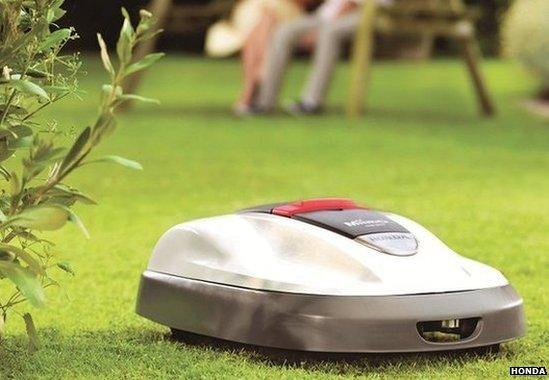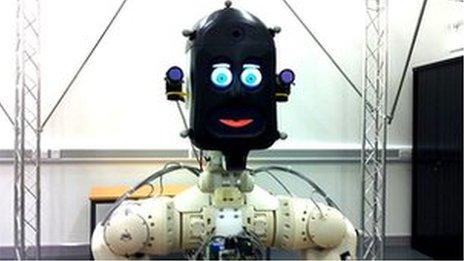Lawnmowing robots bid for a share of a growing market
- Published

The Miimo is marketed as an environmentally friendly alternative to electric and petrol mowers
In his poem The Camel's Hump, Rudyard Kipling recommended a spot of gardening to lift a bad mood.
He may not have approved of what some experts appropriately describe as a "growing market" for gadgets that will do the hard work for you.
The UK launch of a new robot lawnmower by electronics giant Honda follows similar releases by Robert Bosch and John Deere earlier this year.
The Miimo is the first commercial robot that Honda has released for domestic use, although robot lawnmowers have been around for some time - outdoor power products firm Husqvarna launched its first model in 1995.
Slow market
It may sound tempting to recline on a sun lounger with a cocktail while a robot the size of a large tortoise zips around your feet manicuring your lawn for you - but for some reason the idea has not really taken off yet.
While there is evidence that the European appetite for the gardening gadgets is growing, with Bloomberg reporting recently, external that the market "expanded by 30%" last year, indications are that actual sales figures are still small.
Online lawnmower seller Mowdirect says it has offered robot models for nine years, but their best-seller, the Robomow, from Israeli firm Friendly Robotics, accounts for only "2% or 3%" of their business.
"They really haven't been marketed that aggressively in the UK just yet," said manager Stuart Drake. "But there are lots of launches coming up next year."
The owner of a Swedish hardware store, Moheda Jarnhandels, told Bloomberg he had sold 60 robotic lawnmowers in 2012, compared with just 10 in 2007.

The robots are not yet able to compete with their heavy-duty cousins
Miimo's initial sales target is just 4,000 units throughout the whole of Europe.
The manufacturers all seem to be targeting the luxury end of the market - the cheapest Robomow model costs £899 and Honda's Miimo prices will start at £1,990.
The price alone is enough to deter all but the wealthiest gardeners, said Guy Barter, chief horticultural adviser at the Royal Horticultural Society (RHS).
"Horticulture is not such a remunerative career that I can spend that sort of money," he said. "You can get a cheap electric mower for £80 that will do perfectly well for most lawns."
Sensible sensors
Honda claims the Miimo's rechargeable battery uses just £12 of electricity "per season" to maintain the average lawn.
It works by cutting "little and often", designed to trim a couple of millimetres of grass several times a week rather than tackle an overgrown wilderness - and it is packed full of sensors to help it navigate its way around the shrubbery and avoid the prized marigolds.
Like many similar devices, it uses a combination of sensors to detect both solid obstacles in its path and boundary wires that have to be buried by hand around the lawn, and any other areas the gardener wishes the device to avoid.
"It would be a bit of a nuisance if you have several lawns," said Guy Barter.
There are no robotic lawnmowers yet in service at Wisley, the flagship garden of the RHS, Mr Barter added.

Some Husqvarna robot lawnmowers can be operated via iPad
Husqvarna offers a lawnmower that can be controlled remotely via GPS (Global Positioning System) using an iPad app - but according to Professor Chris Melhuish, director of the British Robotics Laboratory, GPS on its own is not ideal for the average-sized garden.
"Micro GPS isn't really good enough," he said. "But you don't necessarily have to have something buried. You could set up line of sight markers - you could have infra-red beams or micro-lasers."
Socially intelligent robots
The take-up may have been slow so far but Professor Melhuish predicts that that "service robotics" - like lawnmowers, and vacuum cleaners - are destined to become a way of life.
"There are going to be lots of opportunities within the next five-to-10 years," he said.
"In the same way as when we first had computers, everyone said, 'What do you want a computer for?' - it'll be like that. It will become part of the infrastructure. It will creep in slowly."
The most likely outcome will be cleaning robots in public places, such as shopping centres and leisure centres, he said.
"The key thing - and it's what we're working on at the moment - is safe human-robot interaction," he added.
"That's not just making the robot compliant, it's making it have advanced social intelligence. If a robot is handing you something hot or sharp for example, it needs to know whether it has your attention.
"One of the big things is making robots socially intelligent. Once you've cracked that, the whole thing bursts open."
As for the lawnmowers - the robotics expert remains unconvinced.
"If it were something I could get for £100, put down half a dozen markers and then off it would go, that would be fine," he said.
"But who does the strimming?"
- Published23 August 2012

- Published10 May 2012
